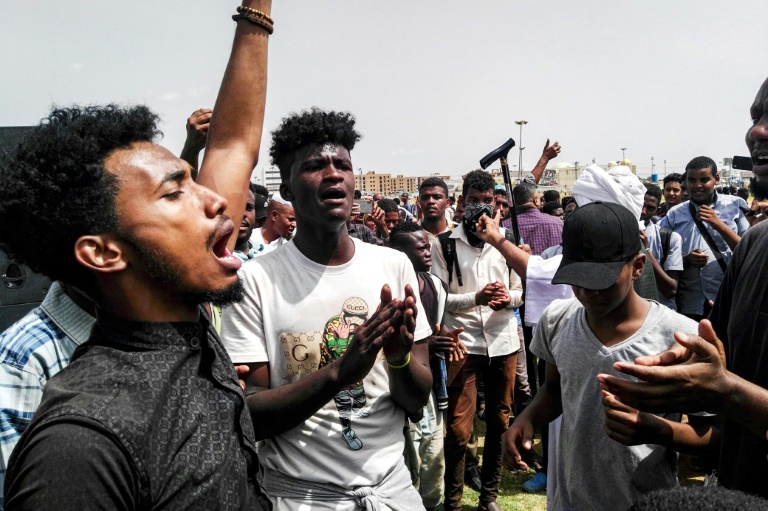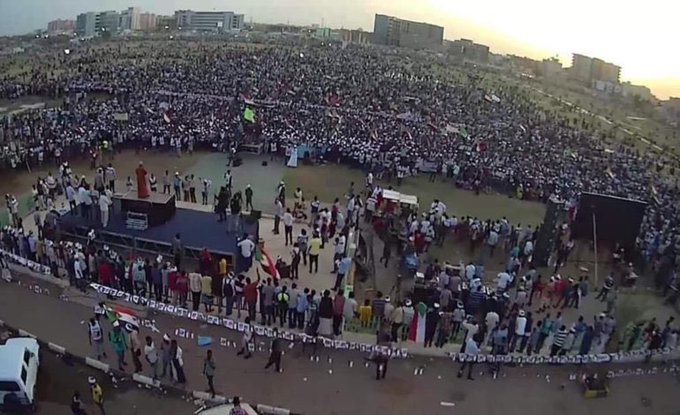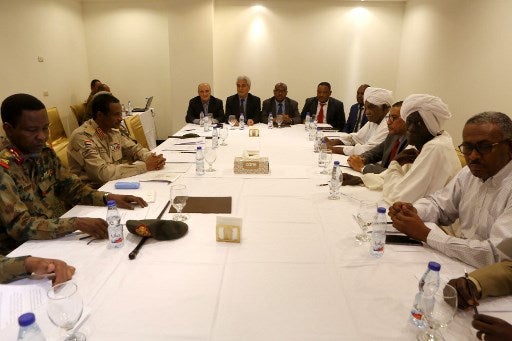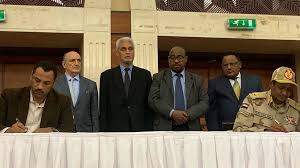Editor’s Note: Links to related news articles have been supplemented to provide background information and further reading.
Since December, images telling the story of Sudan’s unpredictable and unprecedented quakes upsetting an old political order, starting in the streets and leading to the fall of one of the world’s longest lasting dictatorships, overwhelmingly were of young men and women peacefully marching and chanting through the streets of Sudan.
These marches were organized by members of loosely, diffusely webbed and locally-based groups of activists called neighborhood resistance committees.
Activist and film-maker Hajooj Kuka is a member of the non-violent social activism group, Girifna—one of several grassroots organizations in Sudan whose members are engaged in the work of the neighborhood resistance committees. These committees help to coordinate the revolution by relying on a cell-based model of organization where neighborhoods are the cells–or the basic units of the revolution’s structure as an organization. (The full interview with Hajooj Kuka may be found here.)
The neighborhood resistance committees, according to Kuka, are marginalized from the important decision-making meetings on the future government of Sudan, in spite of the high profile in the media of the marches; and the effect of the images of large masses of peaceful protesters on international public sentiment, and, as a natural consequence, on the diplomacy of foreign governments throughout the talks between the Transitional Military Council (TMC)—the junta that assumed power after Omar al-Bashir was ousted—and the Forces of Freedom and Change (FFC)—the umbrella organization of groups supporting the democratic movement in Sudan.
“[Th]e people who are on the street, who are organizing these protests….and putting their lives in danger, don’t really know what’s happening.”
On August 3rd, an African Union (AU) envoy announced that an agreement had been reached between the TMC and the FFC on the final details of a constitutional accord that will set the ground rules for a transitional government aimed at preparing the country for full democracy within three years. The details of the arrangement have not yet been publicly announced and the signing is scheduled for August 4th according to a report in Sudan’s state-run SUNA news agency. There are not many media reports of people celebrating the news in the street; the country awaits the breakdown of the agreement into its finer details. Soon after the AU’s announcement, in a statement on its Facebook page, Girifna asks that the details of the constitutional declaration be disclosed to the public before it is signed and that the FFC represents a “commitment to the charter of freedom, change and non-use of hidden and invisible agreements.”
This statement reflects a frustration that Kuka says exists within the protest movement over the lack of transparency of the TMC-FFC negotiations.
“What we’re noticing is that the negotiation—a lot of it is done is secret. A lot of it—what we hear about—are leaked documents. And we don’t get to see what they’re really negotiating, which is becoming frustrating. It’s becoming—the people who are on the street, who are organizing these protests, who are out and protesting, and putting their lives in danger, don’t really know what’s happening. And this attitude that there’s a few elitists who know better and who should negotiate in hiding…. Is really against the revolutionary feel of what’s happening on the ground, where people feel like this is our revolution, these people are talking on our behalf, and we have the right to see these different drafts and what the thinking [is] behind it. And if there’s any stepping back or giving away rights or whatever, we need to be part of it, and we need to understand why it happened, and we want to see it daily. So we are asking for more transparency. And right now [what] we’re getting, even from our own negotiators is some lies, and total lack of transparency. And we’re not happy about it.”

Image provided by Vania Gulston
In July, Girifna posted a video of a verbal confrontation between Ismael al-Taj, a lawyer and spokesman for the Sudanese Professionals Association “SPA,” an organization seen by many as a leading force in the FFC, and a young Sudanese activist. The activist holds a sign that reads “How much did they pay you?” in Arabic, as he criticizes al-Taj about the FFC negotiating team’s lack of transparency.
Grassroots Fighting for Transparency
[dropcap]G[/dropcap]irifna is one of 22 groups that signed the Declaration of Freedom and Change, the statement announcing the aims of the latest in a 30-year history of protest movements against the regime of Omar al-Bashir, which was reignited in the streets of Atbara by school children upset about the high price of bread. However, Girifna was not one of the groups represented in negotiations between the FFC and the TMC, explains Kuka.
“We asked more than once [to be a part of the meetings]. And we got to the point where we know this is never going to happen…. Our main aim to be in those meetings…was for us to publish what happens. To actually make it transparent.”
A lot of protesters learned about the mid-summer meetings between negotiators for the FFC and the TMC that took place inside of a mansion of a Sudanese tycoon (and which led to the July 5th announcement of the power-sharing deal) messily from gossip in the streets, says Kuka.

Image provided by Vania Gulston
“Sudanese society is very gossipy and we’re excited about saying things, so it came out, but it came out in an unofficial way. It came out in a way with a lot of rumors around it, a lot of people adding their own say with it….So we wanted to be in those meetings. We wanted to be in those meetings just as a watchdog. We do not have any intentions of being part of the government, or doing any of that. But we want to be watchdogs. We want to be there, we want to record everything, we want everything to come out.”
Because they were not allowed to do that, Kuka explains, the goal of many street protesters is to push the demand for transparency even more.
“We know that we’re not going to be accepted easily,” thus, as result, Kuka says, “we’re ready to fight against the FFC if that’s needed.”
Waiting on the FFC to deliver the revolution in the way that Kuka and others want is a frustrating option. “It’s taking time. And as time is passing on, they’re losing our trust, and they’re not delivering….And at the same time, we’re losing trust in them because they’re not sharing.”
“[T]he disconnect between the political ask and the movement on the ground is causing mistrust and also missed opportunities’
As well, the political demands of each demonstration need to be clearly expressed because people are putting their lives on the line each time they engage in public protests, says Kuka.
He would like to see more specific goals attached to each march.
“Right now, when we went out on the [June] 30th, the million people march, and then we went again on the [July]13th, [when] there was a big march, there wasn’t clear political asks. And we were like, to actually gain from [these] huge movements, huge protests, and a lot of organization—that requires a lot of our work, a lot of our energy, a lot of our time, and sometimes our lives. [There] needs to be clear a political ask that’s connected to it. And the disconnect between the political ask and the movement on the ground is causing mistrust and also missed opportunities….[W]e need the people who are negotiating in our name to believe in our power.”
Of the groups represented on the FFC negotiating team, none fully represent the vision of Girifna, Kuka says.

“Right now the FFC [negotiating team] is built from three main blocs. There’s the political bloc, the professionals—the Sudanese Professional Association, and then there is the civil society.”
Not represented at the negotiating table at meetings between the FFC and the TMC is a revolutionary bloc of groups “aimed at moving the streets, and working in the streets, and doing all that work.” The one group Kuka concedes is the closest at representing the interests of this revolutionary bloc is the SPA.
While the SPA were “the closest to the street” and are still trusted, Kuka said, “the politicians are the ones we are most angry at. Because they switch the truth around.”
There is the belief that not only have members of the team of FFC negotiators withheld important details of the negotiations from contingents of the protest movement, but that blatant lies were told about the talks.
Kuka explains, “So what we’re going for is a parliamentary rule that almost everybody is excited about. With the parliamentary rule, you have the prime minister and the prime minister runs the executive branch of the government. Then you have a strong parliament, that runs the legislature. But we have a presidency council. So we have a council that acts as the president. And supposedly, it’s just representative. They don’t have real power. That’s what we were told. And until the African Union draft for the agreement leaked out–that’s the first time we saw that they actually do have some power. And they’re actually asking for more power. And we feel about the presidency council…half of it is military and half of it is civilian. So this is the place where the military is going to stay.

“The other thing that we recently heard is that we’re not able to take them [members of the military council] to court or anything while they’re serving. And the first time we heard about that, we were told this is not true. Until somebody leaked it and said, ‘No this is true.’ And then they said, ‘Yeah it’s true, but we’re still negotiating it.’ So we’re starting to have these lies where you say it doesn’t exist and then, it’s like ah no, no, actually somebody else leaks it. So it’s stuff like this. It’s like small details which made us not trust them anymore because… they are scared to confront us with what they’re negotiating because they feel like the street will not accept it and we will not understand why they’re negotiating these points. “
Revolutionary Change starts with the Community
Ultimately, the path to a full democratic state in Sudan is through the street, says Kuka.
“It’s time for a revolutionary politician.”
“The street is very revolutionary. People are excited. People want change and people want real revolutionary change. We want to go to a new era where Sudan is not ruled by the military, where civilians rule, where we ask for transparency, for justice, for all the pillars of democracy. When you come to the TMC and the FFC, this is lacking.”
On July 13th, Girifna issued a statement via social media that began with the declaration, “It’s time for a revolutionary politician.” The statement reconfirms the group’s commitment to the Declaration of the Forces of Freedom and Change as a revolutionary document, but distances itself from the leadership of the FFC, which it charges with engaging in practices that serve to blackout the FFC-TMC negotiations. The result, it goes on, is the isolation of the revolutionaries from their revolutionary leadership.
Instead, Girifna calls on a new type of leadership. The leadership must be more revolutionary, Kuka asserts.
He describes as an example a group within the FFC that plans weekly civil actions.
“This council is all males. It’s a group of all males. They all live in the center in Khartoum. And they all think the same way. And they’ve been doing this together for a long time. And they just think the same. And they’re not that revolutionary at this point. They were at one time; they’re not anymore. [T]hat group needs to change. They can not be all male. They can not be all from the center. And they can not be the same people. They[’ve] just been there for a long time. So….there are these issues within the FFC. And… you’ll see the same thing in every other part of the FFC: lack of gender equality, lack of ethnic diversity, and lack of different ideas—everybody’s thinking the same. So that’s one thing that needs to happen within the FFC.”
To Kuka, the street is where the revolutionary spirit resides. And Girifina’s recent statement is a call for the forces of the revolution to tap that source once again.
“The statement was saying that … we need revolutionary politicians. We need people who want to go all the way, who want to create a hundred percent civilian government and who want to work in the street. And so we’re saying we need this revolutionary bloc. And that’s what we’re building. So we’re going to stop trying to deal with the FFC and their negotiation and everything…and we want to get ready for the three years that are [to] come or for what happens if this negotiation collapses. [W]e feel like this bloc was the bloc that actually created June 30th. And we feel like this bloc is what’s going to move us forward.”
One weekend in late July, Girifna members were out documenting the street–the chants, rallies, marches, and aggressions of TMC’s security forces–as people responded to the results of an investigation into the June 3rd massacre at a sit-in in Khartoum. A special investigative committee appointed by a public prosecutor provided an announcement July 27th on the result of its investigation into the June 3rd massacre in Khartoum. According to them, eight will be charged for the deaths of 87 people, even though the Central Committee of Sudanese Doctors reports the number is at least 128. They also claimed the massacre was the result of decisions of rogue officers, not TMC’s leadership, and that no rapes took place, despite the reports from doctors documenting 70 cases of rape associated with the sit-in attack.
Many were disappointed.
In response, organized by neighborhood resistance committees, people marched and chanted in the streets that weekend: each revolutionary cell in tandem with a network of many others and live-streamed to the rest of the world on Girifna’s Facebook page. The revolution’s watchdogs work so that Sudan’s revolution is broadcast, transparent, woke, and completely won.




